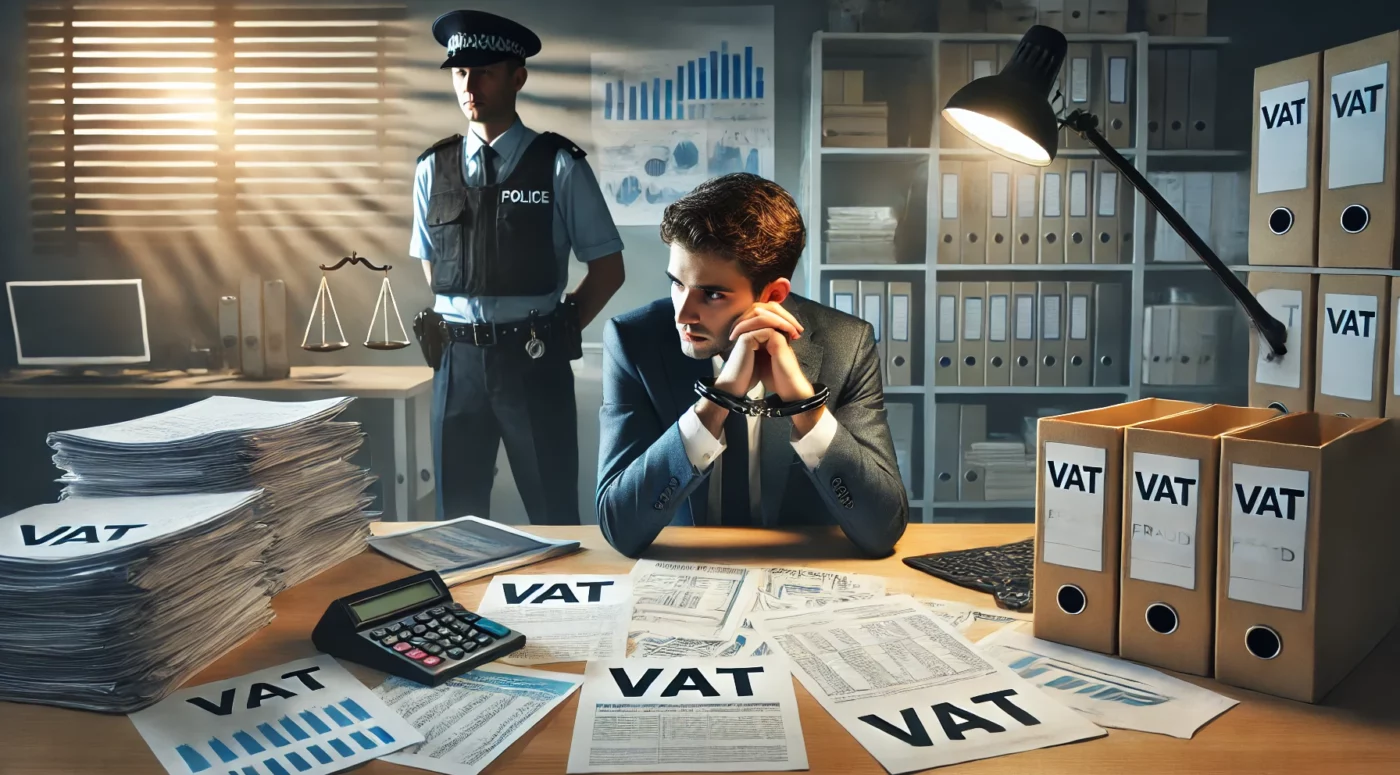

If you are facing an allegation of VAT fraud, you may be feeling overwhelmed and uncertain about what lies ahead. The prospect of criminal proceedings can be daunting, especially if you have never encountered the legal system before. Many people in your position are unsure about what VAT fraud actually means, what penalties they could face, and whether there are alternatives to going straight to prison. You might also be wondering what a suspended sentence is and how you could improve your chances of receiving one. This article is designed to provide straightforward guidance on VAT fraud, the sentencing process, how suspended sentences work, and practical steps you can take to help your case. Our goal is to give you the information you need to make informed decisions and approach your situation with greater confidence.
What is VAT fraud?
VAT fraud is a criminal offence under English law that involves deliberately evading Value Added Tax (VAT) obligations. This offence is typically prosecuted under the Value Added Tax Act 1994 and, in some cases, the Fraud Act 2006. VAT fraud occurs when an individual or business intentionally provides false information to HM Revenue & Customs (HMRC) to reduce their VAT liability or to claim VAT repayments they are not entitled to.
There are several ways VAT fraud can be committed. For example, a business might understate its sales, inflate its expenses, or create fake invoices to reduce the amount of VAT it has to pay. Another common form is “carousel fraud” where goods are moved between companies in different countries to exploit VAT rules and claim refunds fraudulently. The key element is dishonesty; mistakes or misunderstandings are not enough for a criminal charge. In other words, there must be an intention to deceive HMRC.
What are the usual sentences for VAT fraud?
VAT fraud is regarded as a serious offence by the courts, particularly when large sums of money are involved or the fraud has been carried out over a long period. The maximum sentence for VAT fraud in the Crown Court is up to 7 years’ imprisonment and/or an unlimited fine. However, not every case results in a custodial sentence.
Sentences for VAT fraud can range from community orders, such as unpaid work or curfews, to lengthy prison terms for the most serious cases. The court will consider factors such as the amount of tax evaded, the duration and sophistication of the fraud, and whether there was any abuse of trust or position. In less serious cases, or where there are strong personal circumstances, the court may consider a suspended sentence as an alternative to immediate custody.
What is a suspended sentence and how does it work?
A suspended sentence is a type of prison sentence that does not take effect straight away. Instead, the court imposes a custodial sentence but delays its enforcement for a specified period, usually between six months and two years. During this suspension period, you are allowed to remain in the community, provided you comply with certain conditions set by the court.
These conditions might include carrying out unpaid work, attending rehabilitation or educational programmes, or observing a curfew. If you comply with all the requirements and do not commit any further offences during the suspension period, you will not have to serve the prison sentence. However, if you breach the conditions or commit another offence, the court can activate the sentence, meaning you will have to go to prison for the original term, in addition to any new penalties.
A suspended sentence is not a lenient option; it is a serious warning and an opportunity to demonstrate that you can stay out of trouble.
Can VAT fraud result in a suspended sentence?
VAT fraud can sometimes result in a suspended sentence, but this depends on the specific circumstances of your case. The court will look at the seriousness of the offence, including the amount of VAT involved, the length of time over which the fraud took place, and your role in the offence.
For instance, if you have no previous convictions, the amount of VAT evaded was relatively modest, and you have shown genuine remorse, the court may consider suspending your sentence. On the other hand, if the fraud involved a significant sum, was carefully planned, or you have a history of similar offences, a suspended sentence is much less likely.
Understand that a suspended sentence is only available if the court decides that the offence is serious enough to justify a prison sentence, but that there are strong reasons why immediate custody can be avoided.
What factors do courts consider when deciding on a suspended sentence for VAT fraud?
When deciding whether to suspend a sentence for VAT fraud, the court will take into account a range of factors. These include issues such as:
- The amount of VAT evaded is a major consideration. Larger sums, or frauds that have continued for a long time, are more likely to result in immediate imprisonment.
- The level of planning and organisation involved. If the fraud was sophisticated, involved false documentation, or was part of a wider scheme, this will weigh against a suspended sentence. Abuse of trust, such as a business owner or accountant misusing their position, is also taken seriously.
- The impact on public finances and the wider community is another important factor. VAT fraud affects the fairness of the tax system and can have a knock-on effect on public services.
- Your personal circumstances will also be considered. If you have health problems, family responsibilities, or other strong reasons, the court may take these into account.
- Demonstrating remorse and making efforts to repay the tax or cooperate with HMRC can also help your case.
- Your likelihood of reoffending. If you have taken steps to address the reasons behind the offence, such as resolving financial difficulties or seeking support for addiction, this can be a positive factor.
- Your willingness to comply with the requirements of a suspended sentence, such as attending courses or doing unpaid work, is also important.
How serious does the offence have to be for a prison sentence for VAT fraud?
Not every case of VAT fraud leads to a prison sentence. The court will only impose immediate custody if the offence is so serious that no other sentence is appropriate. This usually applies to cases involving large sums of money, a high degree of planning, or repeated offending.
For example, if someone has evaded a substantial amount of VAT over several years, or has used false documents and complex arrangements to hide their activities, the court is likely to see this as so serious that only a prison sentence will do. On the other hand, if the amount involved was small, the offence was a one-off, and there are strong personal reasons, the court may consider alternatives such as a community order or a suspended sentence.
The court will also look at whether you have previous convictions for similar offences. Repeat offenders are much more likely to receive immediate custody. However, even for first-time offenders, the seriousness of the offence can tip the balance towards prison.
What can I do to improve my chances of getting a suspended sentence for VAT fraud?
If you are facing a charge of VAT fraud, there are practical steps you can take to improve your chances of receiving a suspended sentence. The most important is to seek specialist legal advice as soon as possible. An experienced criminal defence solicitor can help you understand the case against you, gather evidence in your favour, and present your personal circumstances in the best possible light.
Showing genuine remorse is also important. This means accepting responsibility for your actions, apologising, and demonstrating that you understand the seriousness of the offence. If you can repay the VAT or make arrangements to do so, this can be a significant factor in your favour.
Providing evidence of positive personal circumstances can also help. This might include references from employers, proof of stable employment, or evidence of caring responsibilities. If you have underlying issues such as financial difficulties, addiction, or mental health problems, taking steps to address these, such as engaging with support services, can show the court that you are committed to change.
Finally, being willing to comply with the requirements of a suspended sentence, such as attending courses or doing unpaid work, can demonstrate to the court that you are taking the opportunity seriously.
Where to get more help
If you are facing a charge of VAT fraud, it is crucial that you get expert legal advice as soon as possible. At Stuart Miller Solicitors, we understand how stressful and confusing this time can be, and we are here to support you every step of the way. We can help you gather evidence, present your case in court, and argue for a suspended sentence where appropriate. Get in touch with our team today for a confidential consultation at no cost to go through your options.
OUR COMMITMENTS TO YOU:
-
Responsive
A legal expert will consult you within 24 hours of making an enquiry.
-
Empathetic
We will always treat you with trust, understanding and respect.
-
Specialised
Your case will be handled by an expert who specialises in your type of offence.
-
Proactive
We will take early action to end proceedings as soon as it is practically and legally possible to do so.
-
Engaged
You will be kept updated on your case at all times. We will provide a named contact available to answer your questions.
-
Caring
We understand this is a difficult and stressful time for you and your family. Our team will support you every step of the way.
-
Tenacious
We will never give up on your case. We fight tirelessly to get you the best possible outcome.

